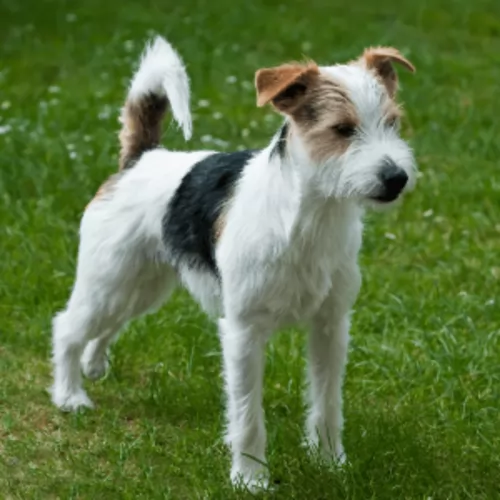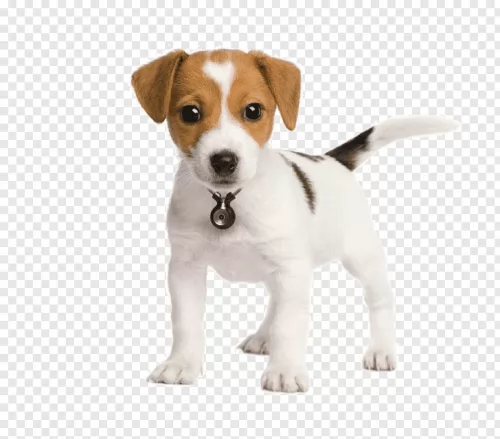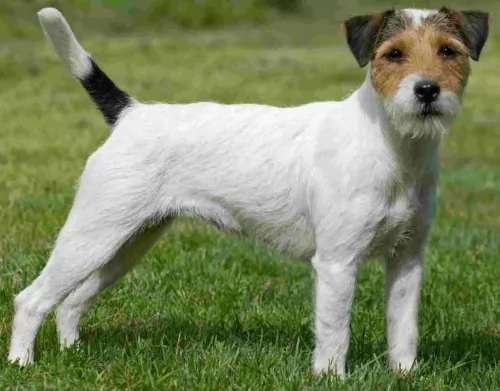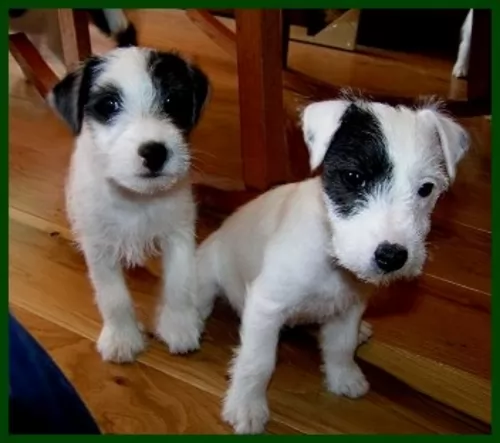 Petzlover
Petzlover Olde English Bulldogge is originated from United States but Parson Russell Terrier is originated from United Kingdom. Olde English Bulldogge may grow 15 cm / 6 inches higher than Parson Russell Terrier. Olde English Bulldogge may weigh 28 kg / 62 pounds more than Parson Russell Terrier. Both Olde English Bulldogge and Parson Russell Terrier has almost same life span. Both Olde English Bulldogge and Parson Russell Terrier has almost same litter size. Olde English Bulldogge requires Low Maintenance. But Parson Russell Terrier requires Moderate Maintenance
Olde English Bulldogge is originated from United States but Parson Russell Terrier is originated from United Kingdom. Olde English Bulldogge may grow 15 cm / 6 inches higher than Parson Russell Terrier. Olde English Bulldogge may weigh 28 kg / 62 pounds more than Parson Russell Terrier. Both Olde English Bulldogge and Parson Russell Terrier has almost same life span. Both Olde English Bulldogge and Parson Russell Terrier has almost same litter size. Olde English Bulldogge requires Low Maintenance. But Parson Russell Terrier requires Moderate Maintenance
 The Bulldog in general has undergone quite a few changes over the years and the Olde English Bulldogge was developed as a designer breed in the United States.
The Bulldog in general has undergone quite a few changes over the years and the Olde English Bulldogge was developed as a designer breed in the United States.
The dog was developed by David Leavitt in 1971, who crossed the English Bulldog with a Pitbull, American Bulldog and Bull Mastiff. Leavitt wanted a dog that would be free of the breathing problems bulldogs battle with. He also wanted the dog to be more nimble, more agile and more healthier.
Crossing the Bulldog, Bullmastiff, American Pit Bull Terrier and the American Bulldog, he developed the Olde English Bulldogge. The dog isn’t recognized as a breed by the AKC.
 The Parson Russell Terrier hails from England and is a small to medium sized dog dating back to the 18th century. It is believed that Reverend John ‘Jack’ Russell was the developer of this dog. The Parson has always been involved with England’s sport of foxhunting.
The Parson Russell Terrier hails from England and is a small to medium sized dog dating back to the 18th century. It is believed that Reverend John ‘Jack’ Russell was the developer of this dog. The Parson has always been involved with England’s sport of foxhunting.
They’re spritely and quick and have been able to keep up on a hunt and take on a fox in its lair. The dog was first recognized in 1990 in the United Kingdom as the Parson Jack Russell Terrier and in America in 1997.
All the top kennel clubs recognize this dog as the Parson Jack Russell Terrier.
 Olde English Bulldogges are purebred dogs. They are big boned, solid and muscular. They are medium sized dogs and stand at roughly between 40 and 51cm and weigh between 22 and 36kg.
Olde English Bulldogges are purebred dogs. They are big boned, solid and muscular. They are medium sized dogs and stand at roughly between 40 and 51cm and weigh between 22 and 36kg.
They have big, broad head and a furrowed face. The ears are fairly small and are semi-erect, semi-floppy. The neck is thick and powerful, the legs short and stocky. The coat is short and is usually white and tan, white and grey, brindle or solid colors of fawn, red and black.
The Olde English Bulldogge is a healthier, more active, athletic dog. It was given this name to differentiate it from the modern English Bulldog.
Olde English Bulldogges are gentle and good natured, snorting around and just dying for his human family to tickle his tummy.
He has an easy-to-please temperament and being intelligent, he will respond well to training and socialization.
He is adaptable and can settle into life in the city or in the countryside. He has strength and stamina but will do better with a walk as opposed to running next to you as you cycle - this will exhaust him and be unhealthy for him.
The Olde English Bulldogge is a sweet, friendly, confident but gentle dog known for his strength and stamina. They are friendly and outgoing, even being social and friendly around strangers. They get on well with children and pets in the home too and will make a wonderful pet.
 The Parson Jack Russell is essentially a white dog with black and tan or orange-fawn patches. He can be tri-colored too. The coat is either smooth, rough or broken.
The Parson Jack Russell is essentially a white dog with black and tan or orange-fawn patches. He can be tri-colored too. The coat is either smooth, rough or broken.
He stands at between 33–36cm tall at the withers and weighs between 5 and 8kg. Unlike the Jack Russell, the Parson Russell Terrier has longer legs. He has some longer hair on the head, legs and body. The ears are floppy wit the tip pointed forward. The tail has always been docked but when left long it it held high, slightly curving over the back.
Feisty, brave, cheeky and alert, the Parson Russell Terrier is an energetic dog who gets on well with children as he knows that this is essentially where his games come from.
He is bold and clever and you’ll be able to have him trained and socialized without any trouble. These little dogs are full of life and they are protective of their humans and their property, making excellent watchdogs.
 The Olde English Bulldogge is a gentle, sweet dog who just wants to be a loved member of your home. He wants to please, so training and socialization will do him the world of good as then he becomes obedient and responds easily to some basic commands.
The Olde English Bulldogge is a gentle, sweet dog who just wants to be a loved member of your home. He wants to please, so training and socialization will do him the world of good as then he becomes obedient and responds easily to some basic commands.
He has a protective nature and will do what he can to guard and protect you. Such a wonderful 4-legged friend and companion deserves your unconditional love.
 In general the Parson is a friendly,loving dog, fairly small but packed full of feisty personality.
In general the Parson is a friendly,loving dog, fairly small but packed full of feisty personality.
They make excellent pets for the entire family. He is an intelligent dog, but typical of most terriers he can be stubborn, but this can easily be fixed with training and socialization. With good care, he’ll make you a wonderful little pet and companion.
 The Olde English Bulldogge can live to be 14 years old if he is looked after well. These dogs are prone to some of the typical dog ailments there are and bloat is one.
The Olde English Bulldogge can live to be 14 years old if he is looked after well. These dogs are prone to some of the typical dog ailments there are and bloat is one.
This ailment is also known as Gastric Dilatation Volvulus, a life-threatening disease regarded as a medical emergency. The stomach can twist, cutting off blood flow to the heart. It occurs more often in deep-chested dogs and you will notice the swollen stomach.
These dogs are considered to have less health issues than other brachycephalic breeds but still you need to keep an eye on their breathing. In fact, David Leavitt, who developed the dog says that this particular mix of dog doesn’t have the undesired negative health aspects of the dog’s relatives such as hip issues, difficult births and brachycephalic syndrome. They are also far more tolerant to heat and cold that other bulldog types.
 Your Parson Jack Russell can live to be between 12 and 15 years but nonetheless he does have some breed-related health issues to watch for.
Your Parson Jack Russell can live to be between 12 and 15 years but nonetheless he does have some breed-related health issues to watch for.
Eye conditions which can affect this dog include primary lens luxation,cataracts, corneal dystrophy and progressive retinal atrophy. With cataracts the lens of the eye develops a cloudy look resulting in poorer vision and sometimes blindness. Cataract surgery is available for dogs.
Your Parson Jack Russel should be lean and muscular and always full of energy. Avoid feeding him unhealthy treats which can lead to obesity and other health problems.
All kinds of parasites such as ticks, fleas and worms can invade your dog’s body. Roundworms, hookworms and tapeworms can cause havoc with their health and some of these parasites can even be transmitted to humans. It’s why it is important to get your puppy to the vet to be de-wormed and to get his first injections.
A liver disorder known as portosystemic shunt can mean that some of the blood supply doesn’t get to the liver and it doesn’t function properly. This will mean the liver can’t remove toxins from the bloodstream effectively.
 There are a number of things you can do to make sure your Old English Bulldogge settles down nicely into his new home.
There are a number of things you can do to make sure your Old English Bulldogge settles down nicely into his new home.
With his short coat, he isn’t described as being hypoallergenic, but the coat is looked upon as not triggering allergies as much as some of the other dog breeds. He will simply require a brush twice a week.
Make sure to take your 8 week old puppy to the vet to check him over and to start with his first vaccines to avoid him getting some of the life-threatening illnesses there are. He will also be de-wormed. Later on as an adult, he or she will need to be neutered or spayed to prevent puppies.
Never leave your dog in a car on a hot day. It can kill him. Rather leave him at home.
Feed your Olde English Bulldogge a balanced diet that provides him with the right amount of minerals and vitamins. The top ingredients of commercially manufactured pet food must be meat. You can add some home-made food into his kibble as a treat as well as some raw meat occasionally. Chopped up boiled chicken, brown rice or pasta and vegetables such as spinach, sweet potato and carrots will be excellent for him. You can also look at the possibility of giving your dog a supplement. Make sure he has a constant supply of fresh, cool water.
 The Parson Russell Terrier has different coat types – the smooth and rough and both will require regular brushing. Rough coats will require plucking or clipping to avoid matting.
The Parson Russell Terrier has different coat types – the smooth and rough and both will require regular brushing. Rough coats will require plucking or clipping to avoid matting.
Check his eyes and ears regularly. Look inside his ears for excess wax and dirt which could lead to an ear infection. His nails should also be trimmed.
The best thing you can do for your Parson Russell Terrier if you don’t want your pet producing puppies is to have it spayed or neutered. Spaying for females or neutering for males decreases the likelihood of certain types of cancers too so it can be beneficial.
Diet is hugely important for a Parson Russell Terrier and the food you decide for him can impact his health. Many time those ‘treats’ you feed your pet do nothing more but give him a stomach ache.
It's tempting to pop chocolates, popcorn, nuts and ice cream into your pets mouth when he is so adorable but in the long run it is shortening his life. All he basically requires and needs is a simple, consistent diet of the top commercially manufactured foods mixed with some tasty home made food from time to time.
Boiled chicken, brown rice and vegetables such as sweet potatoes, carrots and spinach will do your pet wonders. Ensure he always has fresh, cool water available to him.